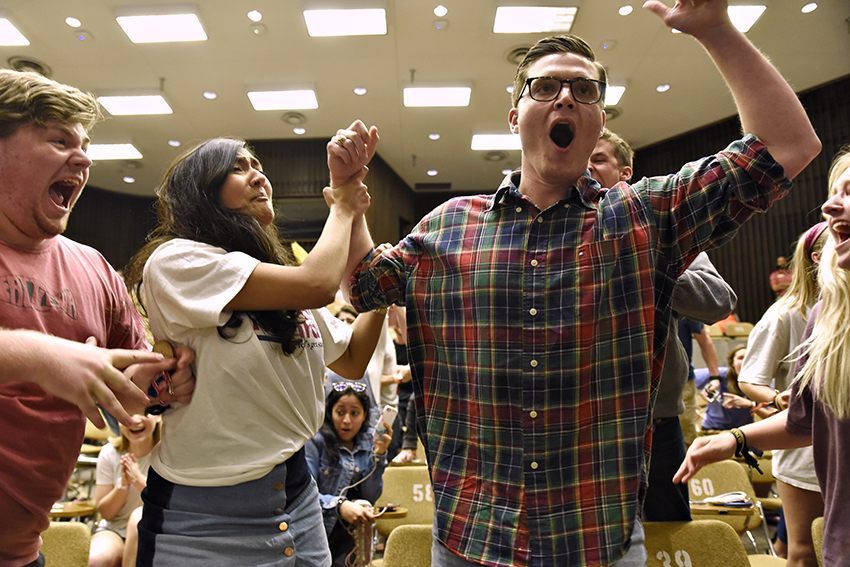After a turbulent campaign period — which had not one, not two, but three elections — Colton Becker and Mehraz Rahman won the executive alliance runoff and will be the next student body president and vice president.
Becker and Rahman received 8,250 votes — the highest number of votes in UT history overall, according to the Election Supervisory Board — which totaled 56.18 percent of the vote. Candidates Guneez Ibrahim and Hannah McMorris secured 43.67 percent of the vote with 6,413 votes.
“I feel relieved that it’s over but also excited for what’s to come,” said Rahman, a marketing and Plan II junior. “There’s a lot of work to be done in terms of addressing campus climate … now it’s part of our job to help address that.”
Although they lost the election, Ibrahim and McMorris said they spread the message that marginalized voices on campus will be heard.
“We are rallying together,” said Ibrahim, a sociology and design senior. “We did not need to win this election to win.”
After a trying six-week campaign period, the Becker-Rahman team will attempt to unify the student body by reaching out to students that identified strongly with the Ibrahim-McMorris campaign, Becker said.
“We just have a lot of work to do mending the wounds of this election,” said Becker, a nutrition senior. “We’re so glad that it’s over, and we want to start reaching out to the other side of the aisle.”
The first election was nullified and the second resulted in a runoff that led to tonight’s final election.
The drawn-out election period reflected how hard marginalized students have to work to challenge the norms on campus, said McMorris, a political communications and African and African diaspora junior.
“I think it’s a testament to how much harder women of color have to work than the mainstream tickets at UT and how much more we had to go through just to get to where we are,” McMorris said.
Becker said the Ibrahim-McMorris campaign was motivated by legitimate campus issues and endured unnecessary harassment.
“So many students saw themselves in Guneez and Hannah, and they made history as the first women of color ticket at UT, and I know that meant so much to a lot of students,” Becker said. “It’s sad the way the election has panned out.”
Ibrahim said their campaign fought for all marginalized students on campus that feel ignored by the University.
“This message has such a powerful statement that’s not going to disintegrate just because we lost,” Ibrahim said. “Black students, brown students, queer students, and most marginalized groups on our campus have been ignored systematically.”
The ESB issued two personal moratoriums earlier in the day against Ibrahim and Becker, prohibiting them from campaigning for several hours. Candidates have 48 hours to appeal any sanctions, which could result in the ESB reviewing the election results.
According to a ruling from the ESB, Ibrahim was prohibited from campaigning from 8 a.m. to 5 p.m. due to a Class B violation for retweeting several endorsement tweets during spring break, a time during which the ESB prohibited campaigning.
Becker was prohibited from campaigning from 1 p.m. to 5 p.m. because he gave a “love-reaction” to a Facebook post accusing the Guneez-Hannah campaign of being complicit in anti-Semitic rhetoric, which the ESB considered verbal harassment, a Class B violation.
The ESB issued a moratorium against the Ibrahim-McMorris campaign during the first election on March 1, which was declared invalid and resulted in the revote, which took place March 7 and 8.
“It’s not over,” Ibrahim said. “It’s just the beginning, because now people are paying attention.”





















